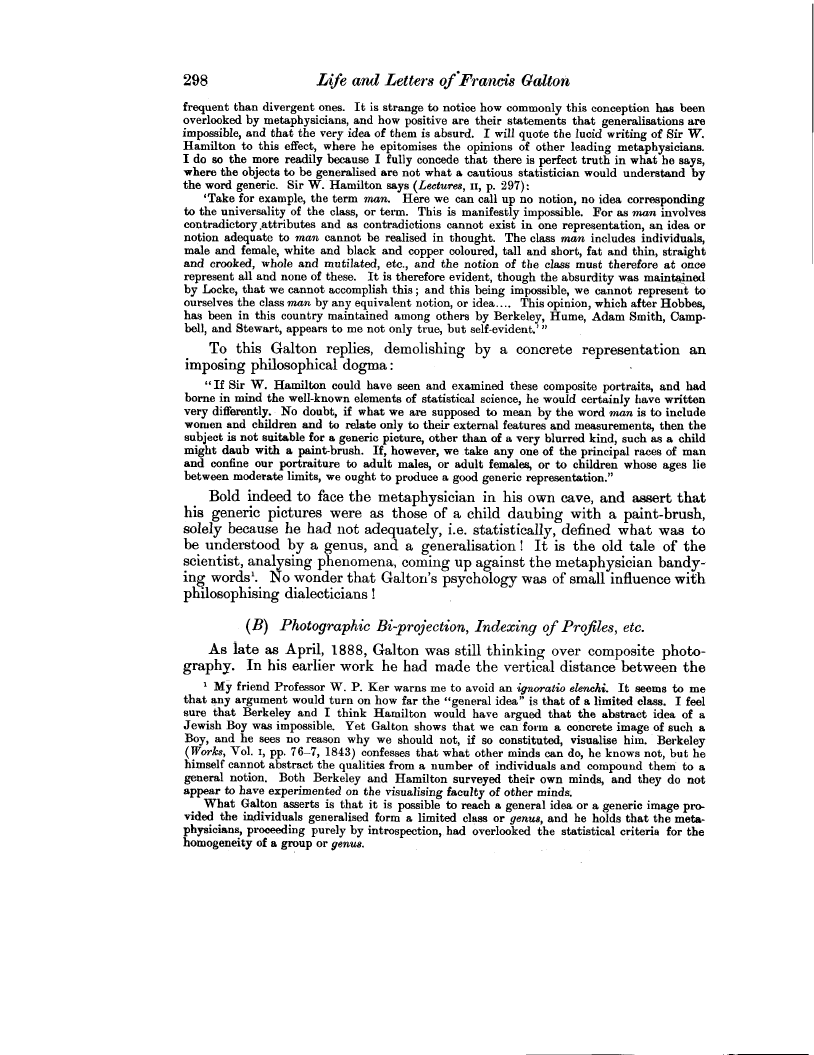298 Life and Letters of Francis Galton
frequent than divergent ones. It is strange to notice how commonly this conception has been overlooked by metaphysicians, and how positive are their statements that generalisations are impossible, and that the very idea of them is absurd. I will quote the lucid writing of Sir W. Hamilton to this effect, where he epitomises the opinions of other leading metaphysicians. I do so the more readily because I fully concede that there is perfect truth in what he says, where the objects to be generalised are not what a cautious statistician would understand by the word generic. Sir W. Hamilton says (Lectures, ii, p. 297):
`Take for example, the term man. Here we can call up no notion, no idea corresponding to the universality of the class, or term. This is manifestly impossible. For as man involves contradictory attributes and as contradictions cannot exist in one representation, an idea or notion adequate to man cannot be realised in thought. The class man includes individuals, male and female, white and black and copper coloured, tall and short, fat and thin, straight and crooked, whole and mutilated, etc., and the notion of the class must therefore at once represent all and none of these. It is therefore evident, though the absurdity was maintained by Locke, that we cannot accomplish this ; and this being impossible, we cannot represent to ourselves the class man by any equivalent notion, or idea.... This opinion, which after Hobbes, has been in this country maintained among others by Berkeley, Hume, Adam Smith, Campbell, and Stewart, appears to me not only true, but self-evident."'
To this Galton replies, demolishing by a concrete representation an imposing philosophical dogma
"If Sir W. Hamilton could have seen and examined these composite portraits, and had borne in mind the well-known elements of statistical science, he would certainly have written very differently. No doubt, if what we are supposed to mean by the word man is to include women and children and to relate only to their external features and measurements, then the subject is not suitable for a generic picture, other than of a very blurred kind, such as a child might daub with a paint-brush. If, however, we take any one of the principal races of man and confine our portraiture to adult males, or adult females, or to children whose ages lie between moderate limits, we ought to produce a good generic representation."
Bold indeed to face the metaphysician in his own cave, and assert that his generic pictures were as those of a child daubing with a paint-brush, solely because he had not adequately, i.e. statistically, defined what was to be understood by a genus, and a generalisation ! It is the old tale of the scientist, analysing phenomena, coming up against the metaphysician bandying words'. No wonder that Galton's psychology was of small influence with philosophising dialecticians !
(B) Photographic Bi projection, Indexing of Profiles, etc.
As late as April, 1888, Galton was still thinking over composite photography. In his earlier work he had made the vertical distance between the
' My friend Professor W. P. Ker warns me to avoid an ignoratio elenchi. It seems to me that any argument would turn on how far the "general idea" is that of a limited class. I feel sure that Berkeley and I think Hamilton would have argued that the abstract idea of a Jewish Boy was impossible. Yet Galton shows that we can form a concrete image of such a Boy, and he sees no reason why we should not, if so constituted, visualise him. Berkeley (Works, Vol. i, pp. 76-7, 1843) confesses that what other minds can do, he knows not, but he himself cannot abstract the qualities from a number of individuals and compound them to a general notion. Both Berkeley and Hamilton surveyed their own minds, and they do not appear to have experimented on the visualising faculty of other minds.
What Galton asserts is that it is possible to reach a general idea or a generic image provided the individuals generalised form a limited class or genus, and he holds that the metaphysicians, proceeding purely by introspection, had overlooked the statistical criteria for the homogeneity of a group or genus.

